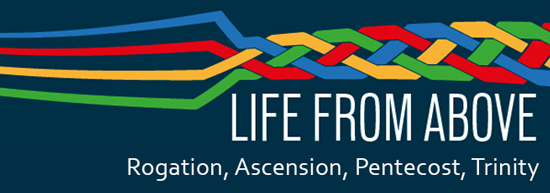
Four Sundays of May commemorating agriculture, the Ascension, Pentecost and Trinity Sunday – are four feasts of great importance in the life of the Church. They are distinctively “named” Sundays.
Rogation Sunday on May 5 (Easter 6) goes back to prayer and fasting in early Christian times for protection for crops from disease. It was also a reflection of the Roman holiday of Robigalia at which a dog was sacrificed to propitiate Robigus, the god of agricultural disease. In England they were associated with the blessing of the fields at planting. The vicar “beat the bounds” of the parish, processing around the fields reciting psalms and the litany. In Christian years it involved fasting and abstinence in preparation for celebrating the Ascension. Traditionally, Rogation days are the three days before Ascension Day on which the litany is sung (or recited) in procession as an act of intercession.
The Ascension (May 9, celebrated May 12) is usually described as marking the completion of Jesus’ ministry on earth as he returned to Heaven. But it is far more than that. It marks the exact moment when Jesus, Son of God, commissioned his disciples to begin the gigantic task of converting the whole world. As recorded in St Mark’s Gospel, Jesus said: “Go into all the world and proclaim the good news to the whole creation. The one who believes and is baptized will be saved; but the one who does not believe will be condemned.”
Luke tells us that Pentecost (May 19) occurred a short time after the Ascension, and marked the fulfillment of Jesus’ promise, at his Ascension, to send the Holy Spirit on the disciples.
The gift of the Holy Spirit electrified these fearful followers – who only weeks before had run away when Jesus was arrested, and were still hiding for fear of those who had been responsible for their Lord’s death – and transformed them into men and women willing to lay down their lives for their faith, as many of them did.
The feast of Holy Trinity (celebrated May 26), though logically linked with the other two, was established much later. Although its existence was clearly stated in the New Testament, and early recognized as a doctrine of the faith, it was only when the Arian heresy – which denied Jesus was God – was spreading in the fourth century, that the church Fathers prepared an Office with canticles, responses, a preface, and hymns, to be recited at Mass. From these, the feast we now celebrate as Trinity Sunday gradually evolved.
Together, these latter three great feasts mark the promise which Jesus gave to his disciples, and its fulfilment in the Church on earth. As recorded by Matthew, the very last words Jesus said to his Apostles before going up to Heaven, were: “Go therefore and make disciples of all nations, baptizing them in the name of the Father and of the Son and of the Holy Spirit, and teaching them to obey everything that I have commanded you. And remember, I am with you always, to the end of time.”
